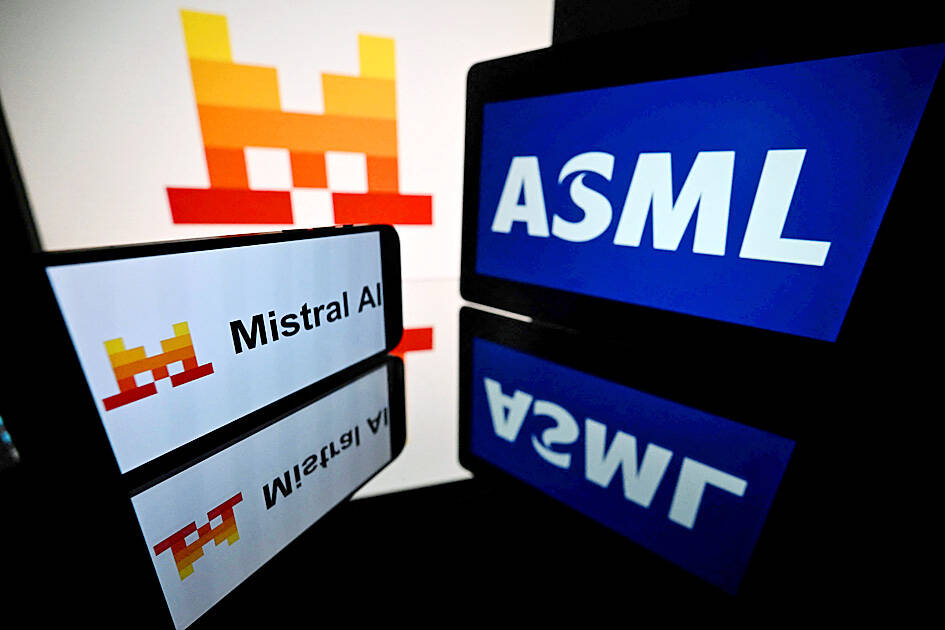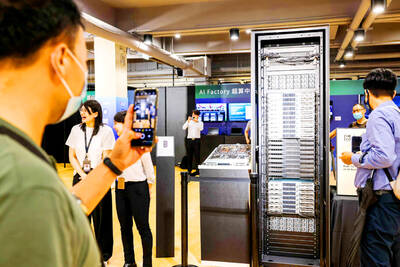France’s Mistral AI SAS yesterday cemented its position as Europe’s top artificial intelligence (AI) hope against far larger US and Chinese competitors after a record fundraising round and a tie-up with chipmaking equipment heavyweight ASML Holding NV.
The 1.7 billion euro (US$2 billion) cash infusion values Mistral at 11.7 billion euros, double its heft last year, but a fraction of the US$183 billion price tag placed on US firm Anthropic PBC this month.
ASML, a key producer of the machines that churn out the chips powering AI models, was the lead investor, with a 1.3-billion-euro infusion that gives the Dutch company an 11 percent stake in Mistral.

Photo: AFP
Mistral has been touted as a European AI champion as technological sovereignty concerns fester between the EU and the US under President Donald Trump.
The deal “aims to generate clear benefits for ASML customers through innovative products and solutions enabled by AI,” ASML chief executive officer Christophe Fouquet said in a statement, pointing to “potential for joint research” in future.
Mistral chief executive Arthur Mensch said its AI could help ASML “solve current and future engineering challenges,” leading to benefits for semiconductor hardware and the AI software that runs on it.
ASML said it would gain a seat on Mistral’s strategic committee, giving the Dutch firm “an advisory role in Mistral AI’s future strategy and technology decisions.”
ASML chief financial officer Roger Dassen would assume this role.
Mistral’s fundraising comes after months of rumors that it could be the target of a takeover bid by Apple Inc, which has lagged other tech giants in developing its own AI.
However, the latest funding round “reaffirms the company’s independence,” Mistral said in its statement.
Other players in the latest investment round included chip giant Nvidia Corp, venture capital funds Index Ventures LLC, Andreessen Horowitz and French public investment bank Bpifrance.
Mensch co-founded Mistral in 2023 after working for Google’s DeepMind AI division, while fellow founders Guillaume Lample and Timothee Lacroix previously worked at Meta Platforms Inc’s AI lab.
The chief executive told the Wall Street Journal in June that Mistral was on course to generate US$100 million in annual revenue.
Mistral’s key products include Le Chat, a large language model chatbot competing with the likes of ChatGPT from the sector’s US heavyweight OpenAI.
As well as text, Mistral offers generative AI models capable of turning out images and computer code.
The company has opened offices in Paris, London, Luxembourg, New York, California’s Palo Alto and Singapore and expanded to more than 350 staff.
This year, Mistral has announced a slew of partnerships, including with Nvidia to create a cloud computing platform and with Saudi investment fund MGX to build an AI campus outside Paris.

LIMITED IMPACT: Investor confidence was likely sustained by its relatively small exposure to the Chinese market, as only less advanced chips are made in Nanjing Taiwan Semiconductor Manufacturing Co (TSMC, 台積電) saw its stock price close steady yesterday in a sign that the loss of the validated end user (VEU) status for its Nanjing, China, fab should have a mild impact on the world’s biggest contract chipmaker financially and technologically. Media reports about the waiver loss sent TSMC down 1.29 percent during the early trading session yesterday, but the stock soon regained strength and ended at NT$1,160, unchanged from Tuesday. Investors’ confidence in TSMC was likely built on its relatively small exposure to the Chinese market, as Chinese customers contributed about 9 percent to TSMC’s revenue last

With this year’s Semicon Taiwan trade show set to kick off on Wednesday, market attention has turned to the mass production of advanced packaging technologies and capacity expansion in Taiwan and the US. With traditional scaling reaching physical limits, heterogeneous integration and packaging technologies have emerged as key solutions. Surging demand for artificial intelligence (AI), high-performance computing (HPC) and high-bandwidth memory (HBM) chips has put technologies such as chip-on-wafer-on-substrate (CoWoS), integrated fan-out (InFO), system on integrated chips (SoIC), 3D IC and fan-out panel-level packaging (FOPLP) at the center of semiconductor innovation, making them a major focus at this year’s trade show, according

DEBUT: The trade show is to feature 17 national pavilions, a new high for the event, including from Canada, Costa Rica, Lithuania, Sweden and Vietnam for the first time The Semicon Taiwan trade show, which opens on Wednesday, is expected to see a new high in the number of exhibitors and visitors from around the world, said its organizer, SEMI, which has described the annual event as the “Olympics of the semiconductor industry.” SEMI, which represents companies in the electronics manufacturing and design supply chain, and touts the annual exhibition as the most influential semiconductor trade show in the world, said more than 1,200 enterprises from 56 countries are to showcase their innovations across more than 4,100 booths, and that the event could attract 100,000 visitors. This year’s event features 17

Hon Hai Precision Industry Co (鴻海精密), which assembles servers for Nvidia Corp, yesterday said that revenue last month rose 10.61 percent year-on-year, driven by strong growth in cloud and networking products amid continued front-loading orders for artificial intelligence (AI) server racks. Consolidated revenue expanded to NT$606.51 billion (US$19.81 billion) last month from NT$548.31 billion a year earlier, marking the highest ever in August, the company said in a statement. On a monthly basis, revenue was down 1.2 percent from NT$613.86 billion. Hon Hai, which is also a major iPhone assembler, added that its electronic components division saw significant revenue growth last month, boosted